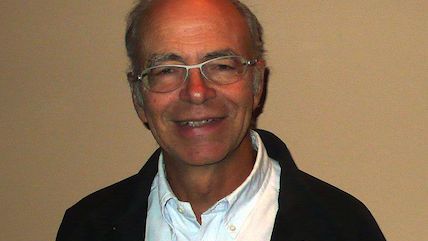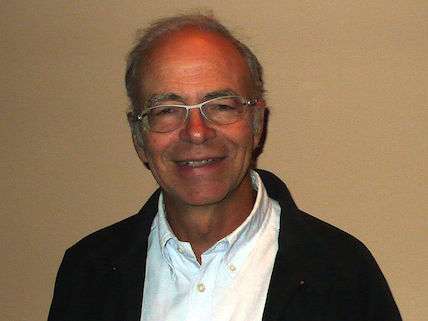Student Protesters Shouted Down the Effective Altruism Club for 'Supporting the Murder of Disabled People'
Peter Singer tries to speak at the University of Victoria.


One might expect a student group called "the Effective Altruism Club" to be among the least likely objects of scorn for irate student protesters. Who could be against altruism—or making it more effective?
Well, University of Victoria radicals it seems. They recently ambushed an event put on by the Canadian university's effective altruism club, and used a megaphone to shout down its featured speaker, philosopher Peter Singer, who appeared remotely via Skype. They even accused the club of implicitly supporting the murder of disabled people, according to The Martlet.
In fairness, "effective altruism"—one of Singer's concepts— is more controversial than it sounds. The movement promotes the idea that people should support the charitable causes that maximize harm-reduction and are more cost-effective compared to other causes (alleviating global poverty is an example of something effective altruists tend to prioritize).
Singer himself is even more controversial. He has occasionally defended human-animal sex, and argues in favor of euthanasia—including some forms of non-voluntary euthanasia. Reason's Ronald Bailey interviewed him in the December 2000 issue of the magazine, and described his views thus:
Singer is perhaps the most thoroughgoing philosophical utilitarian since Jeremy Bentham. As such, he believes animals have rights because the relevant moral consideration is not whether a being can reason or talk but whether it can suffer. Jettisoning the traditional distinction between humans and nonhumans, Singer distinguishes instead between persons and non-persons. Persons are beings that feel, reason, have self-awareness, and look forward to a future. Thus, fetuses and some very impaired human beings are not persons in his view and have a lesser moral status than, say, adult gorillas and chimpanzees.
Given such views, it was no surprise that anti-abortion activists and disability rights advocates loudly decried the Australian-born Singer's appointment at Princeton last year. Indeed, his language regarding the treatment of disabled human beings is at times appallingly similar to the eugenic arguments used by Nazi theorists concerning "life unworthy of life." Singer, however, believes that only parents, not the state, should have the power to make decisions about the fates of disabled infants.
Disability rights advocates are no fan of Singer, and it's easy to see why.
But the effective altruism club maintains that it wasn't promoting Singer's views on euthanasia—the event was focused on "practical ways we can end global poverty, promote animal welfare, and reduce existential risks like climate change," according to The Martlet.
"It's just all about solving climate change and all the stuff that we can all agree on," said one student organizer.
This did not satisfy the protesters, who used a megaphone to disrupt the interview with Singer. Event organizers turned up the volume so that Singer could be heard over the protesters, who chanted "eugenics is hate" and "disabled lives matter."
The police showed up, but did nothing to deter the protesters. They didn't even take away the megaphone.
One protester, Luka Garvin, said that Singer's speech was hate speech, and as such, had no place on campus:
"If it was, let's say, Steve Bannon, talking about the merits of recycling, would you let him onto UVic? I don't think so. Because Steve Bannon practices hate speech, and ableist speech is hate speech, no matter what you believe."
Everything students don't agree with is hate speech, which is a shame, because a university seems like a great place to discuss and debate Singer's ideas—even his more controversial ones. If the ideas are wrong, people can—and should—reject them. What are anti-speech radicals so afraid of?


Show Comments (144)